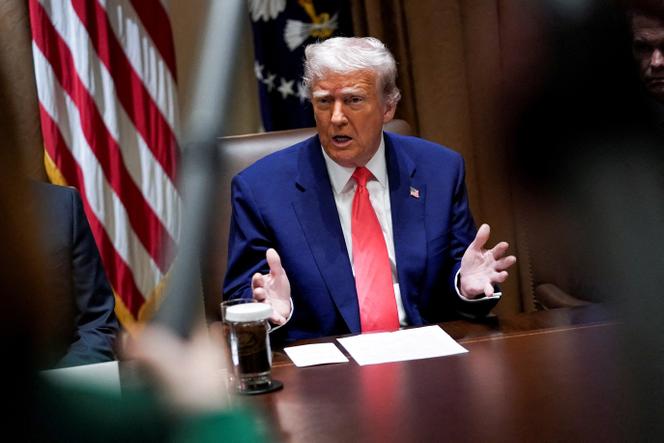
Jitters about US tariffs hammered Asian stocks again early Friday, April 10, as President Donald Trump acknowledged a "cost" to his surging trade offensive against superpower rival China. The US leader said Thursday that the European Union was "very smart" to back off from imposing retaliatory tariffs because of his tough stance on China even as the bloc's chief warned it could tax US Big Tech.
"(The EU) were ready to announce retaliation. And then they heard about what we did with respect to China... and they said, you know, 'We're going to hold back a little bit,'" Trump said. Trump acknowledged "a transition cost and transition problems," but dismissed global market turmoil. "In the end it's going to be a beautiful thing."
On Wall Street, the broad-based S&P 500 finished down 3.5% on Thursday after soaring 9.5% the day before. The Dow Jones shed 2.5% and the Nasdaq 4.3%. In early trade in Asia Friday, Japan's Nikkei tumbled over 5%, handing back some of the 9.1% gain of the previous day. Seoul and Sydney also fell. Oil and the dollar slid on fears of a global slowdown while gold hit a new record. Fellow safe haven asset the yen also firmed against the greenback.
'Golden Age is coming'
In a spectacular climbdown Wednesday, Trump paused for 90 days tariffs of 20% on the EU and even higher levies on other trade partners, including 24% on Japan. But levies on China, which has retaliated with tariffs on US goods, were not only maintained but hiked further.
The White House on Thursday clarified that tariffs on Chinese imports are now at a staggering total of 145%. This was because the latest hike came on top of a 20% tariff already imposed. China has retaliated with levies of 84% on US imports. Trump says he wants to use tariffs to reorder the world economy by forcing manufacturers to base themselves in the United States and for other countries to decrease barriers to US goods.
Howard Lutnick, his commerce secretary, posted on social media Thursday that "the Golden Age is coming. We are committed to protecting our interests, engaging in global negotiations and exploding our economy."
The EU welcomed the US president's partial row-back and the 27-nation grouping responded with its own olive branch. It suspended for 90 days tariffs on €20 billion worth of US goods that had been greenlit in retaliation to duties on steel and aluminum.
But the bloc's chief Ursula von der Leyen told the Financial Times that there remained a "wide range of countermeasures" at the bloc's disposal if negotiations fall short. "An example is you could put a levy on the advertising revenues of digital services" applying across the bloc, she said. This raised the possibility of the use of a new trade weapon called the anti-coercion instrument, according to the FT.
'Welcome reprieve'
Dubbed a "bazooka," the weapon has never been used but empowers the EU to target services and could limit American companies' access to public procurement contracts in Europe. Trump likewise warned that the tariffs could come back after the 90 days. "If we can't make the deal we want to make... then we'd go back to where we were," he said.
Canadian Prime Minister Mark Carney called Trump's reversal a "welcome reprieve" and said Ottawa would begin negotiations with Washington on a new economic deal after elections on April 28. Vietnam said it had agreed with the United States to start trade talks, while Pakistan is sending a delegation to Washington.
In its latest measure, Beijing announced it would reduce the number of Hollywood films imported, but said it remained ready for dialogue. "We hope the US will meet China halfway, and, based on the principles of mutual respect, peaceful coexistence and win-win cooperation, properly resolve differences through dialogue and consultation," Commerce Ministry spokeswoman He Yongqian said.
'Escalating consequences'
Later Thursday, Trump threatened Mexico with "escalating consequences" on trade unless it provides more water to Texas under a contentious decades-old treaty. "Mexico has been stealing the water from Texas Farmers" and "last year the only Sugar Mill in Texas closed" for lack of water, Trump posted to his Truth Social platform.
He claimed that Mexico was violating a 1944 pact under which the US shares water from the Colorado River in exchange for flows from the Rio Grande, which forms part of the border between the two countries. "We will keep escalating consequences, including TARIFFS and, maybe even SANCTIONS, until Mexico honors the Treaty," Trump wrote.
The current treaty cycle expires in October and Mexico owes the United States more than 1.55 billion cubic meters, according to the two countries' boundary and water commission. Washington said on March 20 that it had rejected a request by Mexico for special delivery of water for the first time in response.
Mexico says its lagging deliveries are due to two decades of drought in the Rio Grande basin. But US farmers and lawmakers complain that their southern neighbor has waited until the end of each five-year delivery cycle and has been coming up short in the latest period.
Mexican President Claudia Sheinbaum said last month that the US complaints were "being dealt with" through the boundary and water commission. "There's been less water. That's part of the problem," she told reporters.